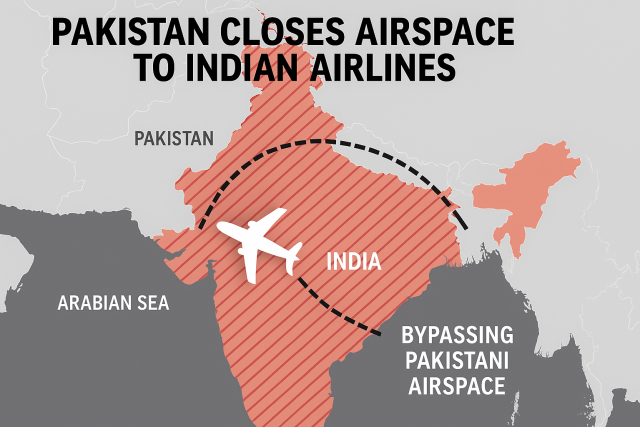Tensions between India and Pakistan have escalated once again following a terrorist attack on tourists in Pahalgam, Jammu & Kashmir. In retaliation to India’s diplomatic and security measures, Pakistan on Thursday announced a significant counteraction — the closure of its airspace to Indian airlines.
The Civil Aviation Authority of Pakistan confirmed that no aircraft owned or operated by India will be allowed to enter Pakistani airspace. This move is expected to have a notable impact on India’s international aviation routes, especially flights heading westward.
Extended Routes, Delayed Arrivals:
Flights from northern Indian cities like Delhi to destinations in Europe, North America, and West Asia typically rely on Pakistan’s air corridor for the shortest and most efficient path. With this route now blocked, airlines will be forced to divert over the Arabian Sea, adding approximately 2 to 2.5 hours to each journey.
Major carriers such as Air India, IndiGo, SpiceJet, and Air India Express have expressed concerns over the operational challenges and financial implications of these alternate routes.
Economic Pressure on Airlines:
Longer routes mean higher fuel consumption, which in turn leads to increased ticket prices — estimated to rise by 8–12% in the short term. Additionally, to maintain flight balance due to the extra fuel load, airlines may be compelled to reduce passenger capacity or cargo weight, impacting overall revenue.
A Repeating Pattern:
This is not the first time Pakistan has taken such a step. After India’s Balakot air strikes in 2019, Pakistan had closed its airspace to Indian airlines for several months. The current action appears to be a repeat of that stance amid renewed bilateral tensions.
What Lies Ahead:
Experts warn that if the closure continues, it could not only disrupt aviation services further but also strain diplomatic ties between the two nations. For passengers, it likely means longer flights and pricier tickets in the days to come.
businesstoday desk











